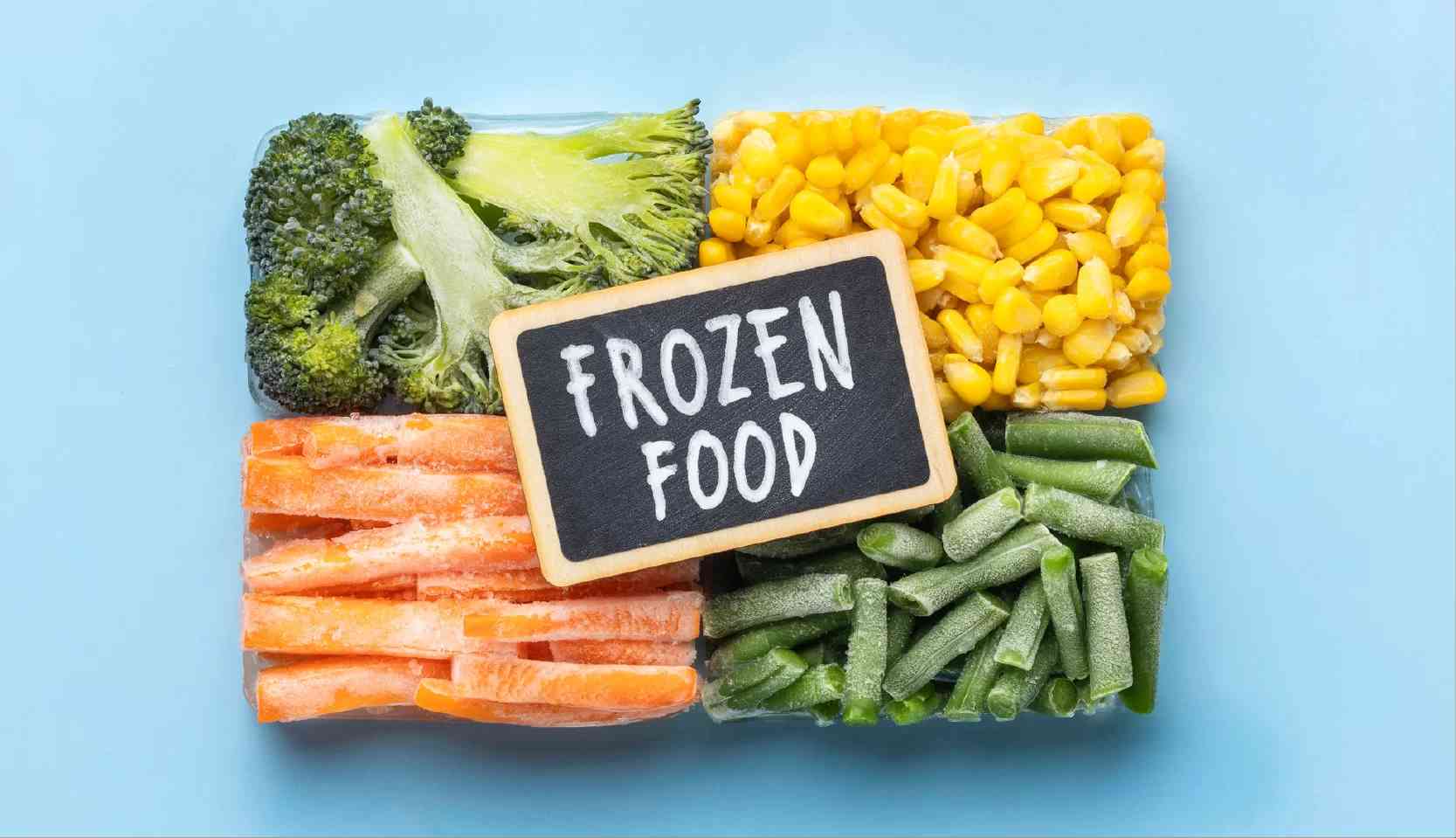Introduction
When it comes to meal choices in today’s fast-paced society, convenience frequently takes precedence above nutritious content. Frozen meals have grown in popularity due to their simplicity of preparation, yet they sometimes fall short in quality and health advantages. Freshly frozen food, on the other hand, is a superior alternative that provides both convenience and nutritional content. In this essay, we will look at why freshly frozen food is superior to frozen meals, emphasizing the benefits of choosing freshness above convenience.
1.Nutrient and flavor retention
Freshly frozen food maintains the natural deliciousness of ingredients while keeping their nutritional value and flavors. Ingredients that are frozen soon after harvest or preparation are preserved at their greatest freshness. To compensate for the loss of flavor and nutrients during processing, frozen meals frequently contain chemicals, preservatives, and excessive amounts of salt. Choosing freshly frozen food guarantees that you receive a balanced and nutritious dinner without sacrificing taste.
The Benefits of Freshly Frozen Food for Nutrient and Flavors Retention:
·Freezing at Peak Freshness
Freshly frozen food undergoes a preservation process that captures ingredients at their peak freshness. Just moments after harvest or preparation, the freezing process begins, locking in the vital nutrients and flavors. By freezing food at its optimal state, essential vitamins, minerals, and antioxidants are preserved, ensuring that your meals are packed with nutritional value.
·Minimizing Nutrient Loss
One of the main challenges faced by the food industry is preventing nutrient loss during storage and processing. Traditional frozen meals often require extensive processing, which can result in the degradation of essential nutrients. However, freshly frozen food minimizes nutrient loss by freezing ingredients immediately, preserving their integrity until you’re ready to enjoy them. This means that you can indulge in a range of vitamins, minerals, and other beneficial compounds with every bite.
·Retaining Natural Flavors
Have you ever noticed how some frozen meals lack the vibrant taste of their fresh counterparts? This can be attributed to the loss of natural flavors during processing and prolonged storage. Freshly frozen food, on the other hand, excels in preserving the authentic flavors of its ingredients. By freezing food promptly, the natural taste profiles are retained, allowing you to savor the deliciousness of your meal as if it were just prepared moments ago.
·Long-Term Storage without Sacrificing Quality
One significant advantage of freshly frozen food is its extended shelf life without compromising quality. Properly frozen ingredients can remain at their peak condition for months, providing you with the convenience of long-term storage while ensuring that you still enjoy the nutritional benefits and delightful flavors when you decide to consume them. This makes freshly frozen food an excellent option for meal planning, reducing waste, and accommodating busy lifestyles.
·Versatility in Culinary Creations
Freshly frozen food offers a wide range of possibilities when it comes to culinary creations. Whether you’re preparing a quick weeknight dinner or experimenting with elaborate recipes, the availability of frozen ingredients allows you to access a diverse array of seasonal produce and specialty items throughout the year. With freshly frozen food, you can unleash your creativity in the kitchen while ensuring that you’re nourishing your body with wholesome and flavorful ingredients.
2.Control Over Ingredients and Customization:
·Tailoring Meals to Dietary Needs
One of the significant benefits of freshly frozen food is the ability to tailor your meals to suit your specific dietary needs. Whether you have dietary restrictions, food allergies, or follow a particular eating plan, freshly frozen food allows you to handpick ingredients that align with your requirements. You can easily customize meals to accommodate gluten-free, vegetarian, vegan, low-sodium, or other dietary preferences, ensuring that you nourish your body in a way that suits your unique needs.
·Access to Fresh and Quality Ingredients
When you choose freshly frozen food, you have the advantage of using high-quality and fresh ingredients. By freezing ingredients at their peak freshness, the nutritional value and taste of the food are preserved. In contrast, frozen meals often contain lower-grade ingredients to cut costs and increase shelf life. With freshly frozen food, you have the freedom to select the finest seasonal produce, premium meats, and other quality ingredients, elevating the overall taste and nutritional content of your meals.
·Flexibility in Recipe Adaptations
Freshly frozen food empowers you to adapt recipes according to your taste preferences and creativity. Whether you want to add an extra kick of spices, experiment with new flavors, or adjust the proportions of ingredients, you have the freedom to do so. Unlike frozen meals that come pre-packaged and pre-portioned, freshly frozen food provides you with the flexibility to customize recipes, giving you a sense of culinary control and the opportunity to explore new culinary horizons.
·Supporting Local and Sustainable Choices
Choosing freshly frozen food also allows you to support local farmers and sustainable food practices. Many freshly frozen food options source ingredients from local farms, fostering a connection with the community and reducing the carbon footprint associated with long-distance transportation. By opting for locally sourced ingredients, you contribute to the sustainability of the food system while enjoying the freshest and most flavorful produce available.
.Personalized Convenience
While convenience is often associated with frozen meals, freshly frozen food offers a personalized approach to convenience. With a well-stocked freezer of your favorite ingredients, you can easily create quick and nutritious meals tailored to your liking. This eliminates the need to compromise on taste, quality, or dietary needs. By having control over the ingredients and customization, you can enjoy the convenience of ready-to-use ingredients while maintaining complete control over the nutritional content and flavors of your meals.
3. Reduced Preservatives and Additives:
·Understanding Preservatives and Additives
Preservatives and additives are substances commonly used in food processing to extend shelf life, enhance flavor, improve texture, and maintain the overall quality of the products. While some preservatives and additives are naturally derived, others are synthetic and may have adverse effects on our health. Examples of common preservatives and additives include artificial sweeteners, colorings, flavor enhancers, and stabilizers.
·Improved Health and Well-being
Reducing the intake of condoms and additives can have a positive impact on our overall health. Studies suggest that certain artificial additives and preservatives may contribute to various health issues, including allergies, hyperactivity in children, and gastrointestinal disorders. By opting for products with reduced preservatives and additives, individuals can minimize the risk of adverse reactions and maintain a healthier lifestyle.
Moreover, a diet focused on natural and minimally processed foods can be rich in essential nutrients, vitamins, and antioxidants. By consuming fresh fruits, vegetables, whole grains, and organic products, individuals can support their immune system, improve digestion, and reduce the risk of chronic diseases such as obesity, diabetes, and heart conditions.
· Enhanced Flavor and Taste
One might assume that reducing preservatives and additives would compromise the flavor and taste of food. However, the opposite is true. By embracing a diet that relies on fresh, natural ingredients, individuals can experience a more vibrant and authentic taste. Natural flavors can be subtle and nuanced, allowing the true essence of food to shine through. Furthermore, reducing additives can help individuals develop a greater appreciation for the natural flavors of food, encouraging healthier eating habits in the long run.
· Supporting the Environment
Beyond personal health benefits, choosing products with reduced preservatives and additives also contributes to a more sustainable and eco-friendly food system. The production and disposal of synthetic additives and preservatives can have a detrimental impact on the environment. By minimizing our reliance on these substances, we can reduce pollution, conserve natural resources, and support sustainable agricultural practices. Additionally, opting for fresh, locally sourced produce can lower carbon emissions associated with long-distance transportation.
·Tips for Reducing Preservatives and Additives
Transitioning to a diet with reduced preservatives and additives may seem challenging, but with a few simple steps, it can be a manageable and rewarding process:
- Read labels: Familiarize yourself with common preservatives and additives and learn to identify them on food labels. Choose products with minimal or no additives.
- b. Cook from scratch: Preparing meals at home using fresh ingredients gives you control over what goes into your food, allowing you to avoid unnecessary additives.
- c. Opt for organic and natural alternatives: Choose organic products and those labeled “all-natural” to minimize exposure to synthetic additives.
- d. Prioritize fresh produce: Focus on incorporating a variety of fresh fruits and vegetables into your diet. They are naturally low in additives and offer numerous health benefits.
And. Explore local markets: Visit farmers’ markets or join a community-supported agriculture (CSA) program to access fresh, locally sourced produce.
4.Better Quality Ingredients:
·Enhancing Health and Nutrition
One of the primary advantages of using better quality ingredients is the positive impact they have on our health and nutrition. When it comes to food, opting for fresh, organic, and minimally processed ingredients can provide us with higher levels of essential nutrients, vitamins, and minerals. These ingredients are typically free from harmful chemicals, pesticides, and genetically modified organisms (GMOs), which are often associated with adverse health effects. By choosing quality ingredients, we can promote optimal well-being and reduce the risk of potential health complications.
·Superior Taste and Flavor
Have you ever noticed how a homemade meal using fresh, high-quality ingredients tastes significantly better than a processed or pre-packaged alternative? The quality of ingredients used greatly influences the flavor profile of a dish. Fresh produce, premium cuts of meat, and artisanal ingredients can elevate the taste of any recipe, making it more enjoyable and satisfying. By using better quality ingredients, we not only nourish our bodies but also indulge our taste buds in a delightful culinary experience.
·Supporting Sustainable Practices
The impact of our choices extends beyond personal health and taste. Opting for better quality ingredients also promotes sustainability and supports ethical practices. Many high-quality ingredients are sourced from local farmers and producers who prioritize environmentally friendly farming methods. By choosing these ingredients, we reduce the carbon footprint associated with long-distance transportation and support fair trade practices, thus fostering a more sustainable food system.
·Skincare and Personal Care Benefits
Ingredients used in skincare and personal care products also warrant our attention. Choosing products that contain high-quality, natural ingredients can have a transformative effect on our skin and overall well-being. Premium skincare products are often formulated with botanical extracts, essential oils, and organic compounds that provide nourishment and protection, while avoiding potentially harmful chemicals. By embracing better quality ingredients, we can enhance our self-care routines and promote healthier skin and hair.
·Building Trust and Brand Loyalty
For businesses operating in the food, beauty, or wellness industries, incorporating better quality ingredients into their products is a key factor in building trust and brand loyalty. Today’s consumers are more informed and discerning than ever before. They prioritize transparency, sustainability, and the use of clean ingredients. By demonstrating a commitment to using high-quality ingredients, businesses can establish themselves as trustworthy and ethical, attracting a loyal customer base that values the quality and integrity of their offerings.
5.Environmental considerations:
·Reduce, Reuse, and Recycle
One of the fundamental environmental considerations is the concept of the “3Rs” – Reduce, Reuse, and Recycle. By reducing waste, reusing items, and recycling materials, we can significantly minimize our environmental impact. Incorporate these practices into your daily life by using reusable water bottles, shopping bags, and coffee cups. Opt for products with minimal packaging and recycle whenever possible.
·Energy Efficiency
Energy consumption is a major contributor to greenhouse gas emissions. To address this, focus on energy efficiency in your home or workplace. Replace traditional incandescent bulbs with energy-efficient LED lights, use programmable thermostats to regulate heating and cooling, and invest in energy-efficient appliances. Additionally, encourage employees or family members to turn off lights and electronics when not in use.
·Sustainable transportation
Transportation is another significant source of environmental pollution. Reduce your carbon footprint by choosing sustainable transportation options whenever possible. Use public transportation, carpool, bike, or walk for shorter distances. If you must use a car, consider switching to electric or hybrid vehicles. By opting for sustainable transportation methods, you can help decrease air pollution and conserve energy.
Water Conservation
Water is a precious resource, and preserving it is essential for environmental sustainability. Implement water-saving practices by fixing leaks, installing low-flow faucets and toilets, and capturing rainwater for gardening purposes. Encourage water conservation in your community by organizing awareness campaigns and educating others about the importance of responsible water usage.
·Eco-Friendly Purchasing
Make conscious choices when purchasing goods and services. Support companies that prioritize environmental sustainability by using eco-friendly materials, promoting fair trade practices, and minimizing their carbon footprint. Look for certifications such as Fairtrade, USDA Organic, or Energy Star to ensure that the products you purchase meet specific environmental standards.
·Sustainable Landscaping
If you have a garden or outdoor space, embrace sustainable landscaping practices. Plant native species that require less water and maintenance. Use organic fertilizers and pesticides to minimize the use of harmful chemicals. Implement rainwater harvesting systems and consider installing solar-powered outdoor lighting. Sustainable landscaping not only benefits the environment but also creates a beautiful and vibrant outdoor space.
·Environmental Education and Advocacy
Raise awareness about environmental issues and inspire others to take action. Educate yourself and others about the importance of environmental considerations through books, documentaries, or workshops. Support environmental organizations and participate in local clean-up initiatives or conservation projects. By becoming an advocate for the environment, you can make a positive impact and contribute to a sustainable future.
Conclusion:
At Alfarah Restaurant, we are committed to providing our customers with the finest dining experience and the highest quality of food. When it comes to the debate between freshly frozen food and frozen meals, we firmly believe that freshly frozen food takes the crown. Freshly frozen food offers a multitude of benefits that set it apart from pre-packaged frozen meals. By freezing our ingredients at the peak of freshness, we lock in their nutrients, flavors, and textures, ensuring a truly exceptional dining experience. Our carefully curated menu, prepared with utmost care and attention, guarantees that every bite is bursting with freshness and flavor. Unlike frozen meals that often contain artificial preservatives, additives, and high levels of sodium, our freshly frozen food retains its natural goodness.
We prioritize using only the finest ingredients sourced from local suppliers, allowing us to maintain our commitment to quality and sustainability. Additionally, our freshly frozen meals offer convenience without compromising on taste or nutrition. Whether you’re a busy professional, a health-conscious individual, or a family looking for a hassle-free meal option, Alfarah Restaurant provides you with the perfect solution. Our frozen meals are prepared with love, allowing you to enjoy a wholesome and satisfying dining experience whenever and wherever you desire. By choosing Alfarah Restaurant freshly frozen food, you are not only treating yourself to a culinary delight but also making an environmentally friendly choice.
Our commitment to sustainability means we minimize food waste and reduce our carbon footprint, ensuring a greener future for generations to come. Discover the difference that freshly frozen food can make in your dining experience. At Alfarah Restaurant, we are dedicated to providing you with the highest quality, most flavorful, and convenient frozen meals that surpass the standard frozen meal options available in the market. Indulge in the extraordinary taste and exceptional quality of Alfarah Restaurant’s freshly frozen food. Order now and elevate your dining experience to new heights.










